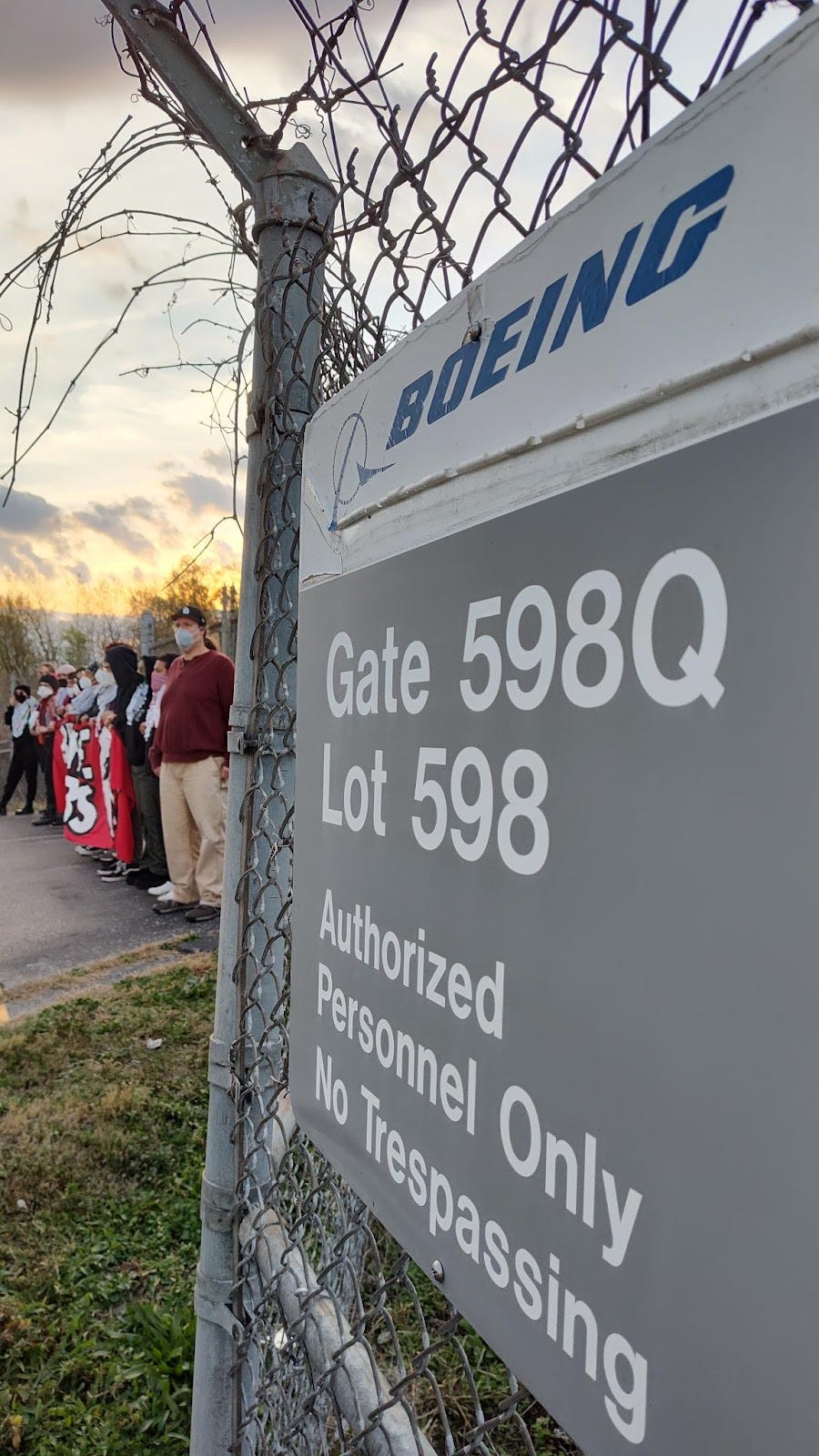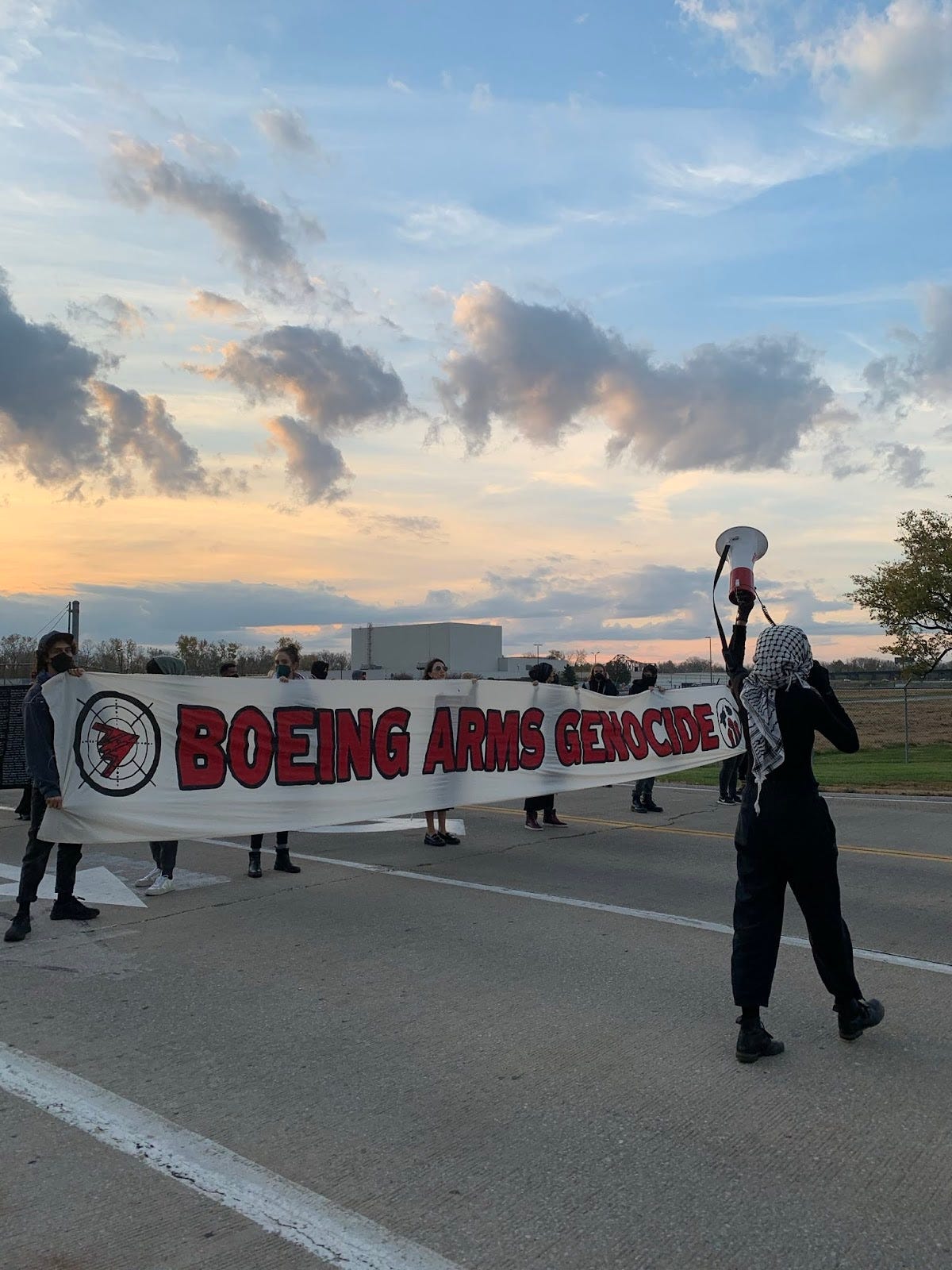Boeing labor leader on Gaza bombardment: “We have a special responsibility to speak out”
We speak to workers at an arms plant in Cori Bush’s district. Plus: Dabke at the Boeing gates
Hi,
Greetings from Atlanta and welcome to the fourth dispatch of Military-Industrial America.
Today: The congresswoman who authored a resolution calling for an immediate ceasefire of Israel’s bombardment of Gaza represents workers at major Boeing plants that produce weapons for Israel. Inkstick called up two labor leaders there to get their takes on Rep. Cori Bush’s foreign policy.
Courtesy of Dissenters/ St. Louis Palestine Solidarity Committee
About three weeks ago, I jogged up to Washington, DC, to see one of the first major Jewish Voice for Peace demonstrations calling for an immediate ceasefire in the Israeli bombardment of Gaza. That hasn't happened, of course, and thousands have been killed since that day. The protest ended with a line of rabbis and rabbinical students in zip-tie handcuffs getting arrested after a sit-in at a Capitol office building. It was, at the time, hailed the largest Jewish-led protest for Palestinian rights in US history; that distinction appears to be getting re-earned multiple times a week as the ceasefire movement grows.
Rep. Cori Bush of St. Louis addressed the crowd, noting the small but growing number of her colleagues who had signed onto her ceasefire resolution filed two days prior. “We must be willing to speak out against war and against violence and against our government’s complicity in it,” she said.
Inkstick believes that hope is logical, global is local, and human security is national security. If you want to support our nonprofit journalism, consider donating to our end-of-year fundraiser today.
What she didn’t say is that her dissent is all the more remarkable because her constituents include workers at Boeing plants in St. Louis and an adjacent suburb, St. Charles, that produce weapons bound for Israel, such as Joint Direct Attack Munitions (kits attached to gravity bombs to turn them into precision-guided weapons) and the 250-pound Small Diameter Bombs hurriedly flown in from a US Air Force base to Israel as it began its bombardment of Gaza. The F-15, made in St. Louis, is reportedly on Israel’s wish list.
Locals are aware. By early Monday morning, about 75 activists showed up at the St. Charles plant to block its gates. They danced the Levantine line dance known as the dabke and drew a single counter-protester, a man with a cardboard sign reading “BOEING FREEDOM.”
Courtesy of Dissenters/ St. Louis Palestine Solidarity Committee
“When the product of our labor is misused, I think we have a special responsibility to speak out”
Two labor leaders in the Machinists union that represents local Boeing workers, one a military veteran and the other an employee active in local progressive causes, kindly chatted with me about both their personal opinions and the views they encounter among their workforce. Both asked for anonymity, fearing backlash from their employer in a political climate that has been described as McCarthyite. While they had some differences of opinion, there was one point they felt certain of: That Bush’s advocacy for a ceasefire is unlikely to change how plant workers see her, even as some observers, like the writer of this letter to the editor in the St. Louis Post-Dispatch, seek to paint her as “anti-jobs” for votes that run up against the bottom line of local employer Boeing.
“The relatively newer, more progressive wing of the Democratic Party… they’ve weathered a lot already,” the military veteran told me. “They’ve already done everything that they could do to call her [Bush] communist and anti-American. So I find it hard to believe that this [ceasefire] is going to be a sticking point. I don't imagine a lot of St. Louis city voters, basically her district, waking up and being like: ‘Oh, my gosh, she's not gonna let us blow up children with our bombs! That's it, you crossed the line’.”
Inkstick is dedicated to seeking insight into what has become a defining feature of modern existence: life amidst endless war. Read about our impact and how to support us here.
I remarked to the veteran several times during our conversation that he was strikingly resolute and articulate about war, politics, and his industry when discussing topics (Israel-Palestine, arms manufacturing) in which moral quandary and equivocation abound. (He attributed his political awakening to being part of a post-9/11 generation that experienced the Iraq War.) He told me that, in the current world, he believes there are legitimate ways that a state would use the weapons his plant produces, such as Ukraine defending itself against a Russian invasion. But he said his congresswoman is right when it comes to Israel and Gaza.
“I think that the fact that we make not just fighter jets but also ordinance means we have a special responsibility to speak out when the equipment that we produce is being used to wholesale murder women and children, because we enable that by producing those bombs. We enable that by producing that fighter jet,” he said. “When the product of our labor is misused, I think we have a special responsibility to speak out and point out when someone is not using it to defend their nation but instead to commit a genocide.”
The progressive activist told me that he was “split on the issue” because he believed Hamas should be defeated, but also said America’s own recent experience showed the folly of such a war. "We went into that War on Terror for 20 years," he said, and the US can hardly claim it defeated terrorism.
“If the local aircraft manufacturer is a low-paying job, what do you think the next place is gonna be like?”
Both pointed to a generational divide among the workforce exacerbated by a 2014 contract that slashed pensions and hourly pay for newcomers, leading to younger employees with a stronger sense that the status quo isn’t working for them. (Labor leaders at Lockheed in Marietta here in Georgia described a similar dynamic to me, their turning point being a 2011 contract that cut pensions.) The veteran said he believes the political leanings at his workplace in St. Louis track national polling of Machinists union members, in which more than 30% voted in a recent presidential endorsement survey to back either Republicans or Robert F. Kennedy Jr. “Most of the people in my union don’t like her [Bush],” the progressive activist told me, adding, however, that she’s actually the only member of Congress who will reach out to their political action committee. He still thought she had plenty of local support to fend off any primary challengers who could allege she’s anti-local jobs. “I don’t think she’ll lose if she wants to run again.”
The military veteran told me that the younger workers being hired at Boeing nowadays are more diverse than the old guard and are more open to progressive ideas, in part because they aren’t living what he called the “American dream” of suburban homeownership and golf club membership. He told me a story of when he was handling long titanium tubes across the table from an old-timer who was covered by a more advantageous union contract. The veteran overheard the older employee holler to a coworker: “Can you believe these idiots coming in here for $15 an hour? What kind of dumbass takes a job for $15 an hour?” The young veteran interjected: “They brought me in at $13!” He had worked retail during his college years, knew what it felt like to be stuck in a dead-end job, and said Boeing was some improvement over that. “If the local aircraft manufacturer is a low-paying job, what do you think the next place is gonna be like?” he said.
What I’m Following
White House Requests “Unprecedented” Loophole That Would Obscure Arms Sales to Israel
Our colleagues at Women for Weapons Trade Transparency report on a White House move to blanket-approve weapons sales to Israel without first notifying Congress for approval. Those official notices are important for my beat – they often include the location of the US plant that will manufacture the weapons (for example, like this), clueing me into which local economies and congressional districts are connected to which foreign conflicts (i.e., the topic of this whole newsletter today).
Researchers Against the War Machine: Lessons from NARMIC
I enjoyed a recent webinar put on by LittleSis, a group of young open-source investigators who track money and relationships among powerful people and entities. National Action/Research on the Military-Industrial Complex (NARMIC), started by a group of antiwar Quakers, was the “research arm” of the peace movement during the Vietnam War and through the mid-1980s. The wartime sleuths used trade magazines and official reports shed light on who was profiting from the war — readers of this newsletter will see plenty of familiar names and places in their Military-Industrial Atlas of the United States from nearly half a century ago.
If you’re in Salt Lake City…
You can pick up a copy of the Salt Lake City Weekly, the largest alt-weekly in the state, which is republishing our investigation into the deaths of two workers at a Northrop Grumman hypersonic missile plant in January. I also had the chance to discuss their deaths on Salt Lake City’s KRCL radio and The Valley Labor Report of Huntsville, Alabama.
Thank You for Reading!
If you’re not a defense contractor or a government entity, we’d love for you to consider a tax-deductible donation to our work. Endless war is a defining feature of American life, and we believe there should be a public interest media outlet dedicated to covering it. You can read more about our work in our impact report.
Thoughts, comments, story suggestions? Send them my way. We may publish them in a future newsletter.
Taylor








